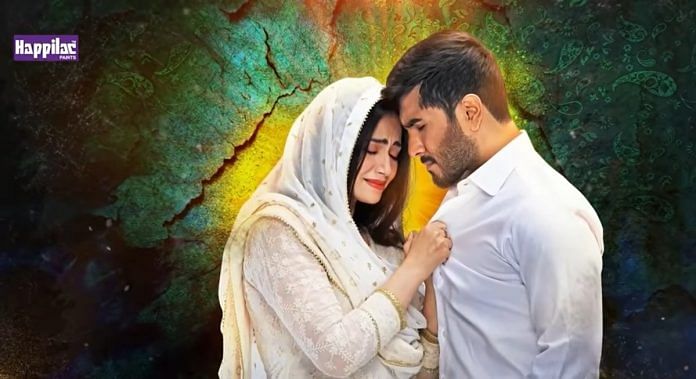Pakistani TV serials are hugely popular among Indians for their family sagas and strong women-centric roles. But writer Nemrah Ahmed has called out the underlying toxic hero culture in Pakistani TV dramas, creating a huge buzz among viewers.
Criticizing Pakistani shows featuring actors such as Danish Taimoor’s Deewangi and Ishq Hai, Feroze Khan’s Aye Musht-E-Khaak and Haroon Kadwani’s Ruposh, Ahmed advised them “to be responsible enough to choose roles wisely”.
The writer said that these “toxic abusive partners become Zahir Jaffar” – referring to the Pakistani-American man accused of raping and beheading his girlfriend, the daughter of a former ambassador, Noor Mukadam, after she refused his marriage proposal. The 2021 case sparked protests across the country.
“On one side we are fighting against Zahir Jaffars and on the other side we are glorifying these narcissist men,” Ahmed said.
“This is how Bollywood has raised a generation. Present violent heroes, make girls believe that a man who runs after them consistently is a LOVING man and get applause…A man who runs after you even after you have said NO is a red flag,” Ahmed added in a separate post.
She suggested that these characters should be portrayed as “villains instead” and that the shows should teach girls how to come out of such relationships and how it’s not okay to settle for such men’.
Nemrah Ahmed’s post made headlines in various Pakistani news media outlets with social media users applauding her for saying this out loud.
“We often hear that rock bottom is where the preference for Pakistani dramas lie-but even below this is the pits of hell from which should be solely preserved for the male leads from these dramas,” niche.com reported on Nemrah Ahmed’s social media post.
“The Pakistani drama industry may be slowly evolving but it’s still clinging to the portrayal of abusive relationships and toxic male leads,” said images.dawn.com, in a report on Ahmed calling out Pakistani show creators and writers.
“Renowned writer Nemrah Ahmed has called out Pakistani media for promoting ‘violent and obsessed heroes.’ The writer expressed her opinion after a scene from Feroze Khan’s drama Aye-Musht-e-Khaak received flak online”, said siasat.pk in a report.
Galaxy Lollywood’s show What’s The 411! discussed whether Pakistani dramas are promoting a toxic hero culture and pointed out that particular scene from the show Aye Musht-E-Khaak suggests that portrayal of abuse is normalised but Pakistani shows have “problems with intimacy scenes”.
Pakistani journalist Mahwash Ajaz agreed with Nemrah and said Feroze Khan’s character Bobby is abusive, manipulative and arrogant.
Guys, I can’t believe I have to say it but Bobby aint a hero in Ay Musht e Khaak. He may have redeeming qualities but he’s a spoilt, messed up human being. Dude’s abusive, manipulative & arrogant. Please stop with the 😍😍😍. #FerozeKhan #PakistaniDramas pic.twitter.com/z9D6osXrz0
— Mahwash Ajaz 🇵🇰 (@mahwashajaz_) January 27, 2022
A Twitter account named ‘Sam’s thought’ called Nemrah Ahmad ‘brave’ and hoped that others will think before signing such roles.
#nemrahahmed is brave enough to say such things @HarPalGeoTv is the top one to glorify such toxic men. Hope so @ferozekhaan #DanishTamoor #HaroonKadwani & others will think about that before signing such roles.
— Sam's Thoughts (@sam5928) January 28, 2022
“Stop showing toxic guys as a hero,” said Twitter user Tooba.
Highly agreed with Nemrah Ahmed 👌💯
Stop showing toxic guy as a HEROO ❌#nemrahahmed #FerozeKhan #DanishTaimoor pic.twitter.com/Aq8WyU1GPW
— T O O B A 🦋 (@LazyEngr9) January 27, 2022
Sharing the stills from the show Aye Musht-E-Khaak, Zahra Noreen said that it was mental torture. “It was ugly, brutal and insensitive piece of writing,” she said.
#AyeMushtEKhaak I never tweet about dramas but this made me so upset. At the time of #NoorMuqaddam case and feeling insecure how insensitive this act was. It is not a good piece of acting #FerozeKhan it was mental torture. It was ugly, brutal and insensitive piece of writing. pic.twitter.com/S1xb25NiGP
— Nor_ Zahra (@ZahraNoreen) January 27, 2022
Facebook user Rania Noor said “Actors need to take responsibility to not do these kinds of characters”.
Syeda Khadija Kazmi questioned the writer’s argument saying “it’s a drama or a movie for a reason…unrealistic element is must otherwise it will look like a documentary or someone’s biopic and that nobody told us to behave the way these characters behave.”
Another user Sayed Abdul Basit Shah even suggested that Nemrah Ahmed “should call out Pakistani dramas as being stereotyped with typical stories featuring women as being hostile to one another, cruel mother-in-laws, moms, sisters, wives conspiring all the time.”



